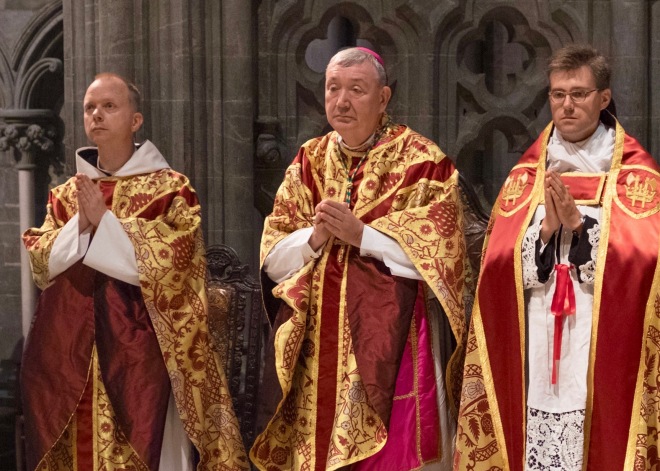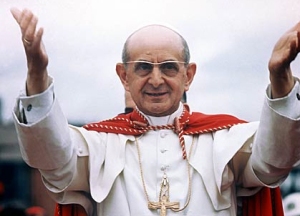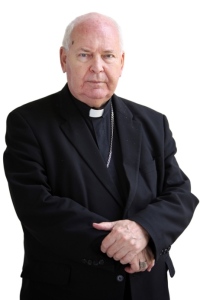After a vacancy that lasted just over a decade, the Territorial Prelature of Trondheim will finally have a bishop-prelate again. Since 2009, when Bishop Georg Müller was forced to retire (more about that here), the pastoral responsibility for the central Norwegian circumscription was in the hands of the bishop of Oslo, Bernt Eidsvig, who served as apostolic administrator.
 The new bishop of Trondheim is a Norwegian, but coming home by way of England, where he has been the abbot of the Mount Saint Bernard Abbey, a Trappist monastery in Leicestershire. Bishop-elect Erik Varden is, despite his role as abbot, young for a bishop. At 45, he is the fifteenth-youngest bishop in the world, and certainly the youngest in Scandinavia and Europe (if we exclude Ukraine, a country which can boast seven bishops aged 43 and younger). Additionaly, Fr. Varden has also not been a priest or a religious for very long. He entered the Order of the Cistercians of the Strict Observance in 2002, made his first profession in 2004, his solemn vows in 2007 and was ordained a priest in 2011. He has been the abbot of Mount St. Bernard since April of 2015.
The new bishop of Trondheim is a Norwegian, but coming home by way of England, where he has been the abbot of the Mount Saint Bernard Abbey, a Trappist monastery in Leicestershire. Bishop-elect Erik Varden is, despite his role as abbot, young for a bishop. At 45, he is the fifteenth-youngest bishop in the world, and certainly the youngest in Scandinavia and Europe (if we exclude Ukraine, a country which can boast seven bishops aged 43 and younger). Additionaly, Fr. Varden has also not been a priest or a religious for very long. He entered the Order of the Cistercians of the Strict Observance in 2002, made his first profession in 2004, his solemn vows in 2007 and was ordained a priest in 2011. He has been the abbot of Mount St. Bernard since April of 2015.
Fr. Varden was informed of his appointment by Archbishop Edward Adams, the Apostolic Nuncio to Great Britain. The fact that it was that nuncio, and not Archbishop James Green, the papal representative to Norway, who made this call, does beg the question if the appointment was made with or without the latter’s involvement. In a letter to the faithful of Trondheim, who number some 14.000 in 5 parishes, Bishop-elect Varden reflects on the significance of the date on which he received the news, writing:
“On the feast of St Theodore of Tarsus, 19 September, I was told that the Pope had named me bishop of Trondheim. The Nuncio in London communicated the news. He could not have been kinder. He reminded me that Theodore, like me, had been a monk; that he, too, in the name of obedience had been asked to leave a life and brethren he loved dearly. A compatriot of St Paul, he was appointed to Canterbury in 669. And there, said the Nuncio, he became a blessing — a sign of the Church’s unity, which transcends national and cultural boundaries. Theodore ‘set the Church on a firm foundation’, says the Collect for the day, which continues: ‘[may we too] remain steadfast on the rock which is Christ and be obedient to the calling we have received’.”
In the same letter, the new bishop also outlines something of a mission statement. Sharing a conversation he had in Ireland with an elderly monk on his death bed, who said that it grieved him to see Christ disappearing from Ireland. Fr. Varden says this has been an inspiration for him ever since, and writes:
“The situation my brother referred to is the same in much of Europe. In a world, a time, ever more marked by indifference and cynicism, hopelessness and division, it is our task to stand for something else: to point toward the Light that no darkness can overcome, to nurture good will, to let ourselves be reconciled, to enable a communion founded on trust, in peace, to bear witness that death has lost its sting, that life is meaningful and beautiful, of inviolable dignity. This is a great responsibility, but also a privilege — a source of transformative joy.”
 ^Bishop-elect Erik Varden, left, with Bishop Bernt Eidsvig of Oslo, during the former’s previous visit to Trondheim in 2018, when he gave the annual Olsok lecture.
^Bishop-elect Erik Varden, left, with Bishop Bernt Eidsvig of Oslo, during the former’s previous visit to Trondheim in 2018, when he gave the annual Olsok lecture.
The modern Territorial Prelature of Trondheim, a designation which places it just beneath a full diocese, can trace its history back to 1931, when it was established as the Mission sui iuris of Central Norway. In 1935 it was elevated to an Apostolic Prefecture and in 1953 to an Apostolic Vicariate. It took its current form in 1979, taking the name of Trondheim instead of Central Norway. The territory has had bishops since 1953, and Bishop Varden will be the fourth in that line. The long vacancy of the seat of Trondheim is not unique, by the way. Between Bishop Gerhard Schwenzer (1979-1983) and Georg Müller (1997-2009), the vacancy lasted no less than fourteen years.
The time and place of Bishop Varden’s consecration and installation, as well as the prelates involved, are yet to be announced.

 Although he was canonised last October, the liturgical texts for the memorial of Pope Saint Paul VI were published only today.
Although he was canonised last October, the liturgical texts for the memorial of Pope Saint Paul VI were published only today. 

 Tomorrow, Pope Francis will create his fourth batch of cardinals. A small group of five this time (the smallest since Blessed Paul VI’s creation of four cardinals in 1977), but one unique in its variety, both in the places the new cardinals call home and in their hierarchical positions among the world’s bishops: One is an archbishop of a major metropolitan see, the other an auxiliary bishop; one runs a diocese covering an entire country, the other a sparsely-populated stretch of mountains and jungle, while another resides in a mostly Muslim society.
Tomorrow, Pope Francis will create his fourth batch of cardinals. A small group of five this time (the smallest since Blessed Paul VI’s creation of four cardinals in 1977), but one unique in its variety, both in the places the new cardinals call home and in their hierarchical positions among the world’s bishops: One is an archbishop of a major metropolitan see, the other an auxiliary bishop; one runs a diocese covering an entire country, the other a sparsely-populated stretch of mountains and jungle, while another resides in a mostly Muslim society. This consistory, like others before it, comes with its own developments. This time, it is Archbishop Jean Zerbo of Bamako, Mali, who is at the centre of attention. Yesterday, the news
This consistory, like others before it, comes with its own developments. This time, it is Archbishop Jean Zerbo of Bamako, Mali, who is at the centre of attention. Yesterday, the news  On Thursday, the traditional first Mass of the new cardinals with the Pope will be combined with the Mass for the feast of Saints Peter and Paul, after which the pallia for the past year’s new metropolitan archbishops will be distributed. Under Pope Francis’ new rules, the actual imposition of the pallia will take place in the archbishops home dioceses. It is not mandatory for the new archbishops to attend and collect their pallia themselves, but it is expected that most of this year’s 34 will do so.
On Thursday, the traditional first Mass of the new cardinals with the Pope will be combined with the Mass for the feast of Saints Peter and Paul, after which the pallia for the past year’s new metropolitan archbishops will be distributed. Under Pope Francis’ new rules, the actual imposition of the pallia will take place in the archbishops home dioceses. It is not mandatory for the new archbishops to attend and collect their pallia themselves, but it is expected that most of this year’s 34 will do so. Congratulations to Cardinal Adrianus Johannes Simonis, who yesterday celebrated the 60th anniversary of his ordination in Utrecht’s cathedral of St. Catherine. The 85 year-old cardinal was archbishop of Utrecht from 1983 to 2007 and his successor, Cardinal Willem Eijk, invited him to mark the milestone in his former cathedral, the mother church, in a way, of the entire Dutch Church province.
Congratulations to Cardinal Adrianus Johannes Simonis, who yesterday celebrated the 60th anniversary of his ordination in Utrecht’s cathedral of St. Catherine. The 85 year-old cardinal was archbishop of Utrecht from 1983 to 2007 and his successor, Cardinal Willem Eijk, invited him to mark the milestone in his former cathedral, the mother church, in a way, of the entire Dutch Church province. “In all these developments you always remained true to your motto, which you also quoted in your homily in this morning’s Eucharist: “Ut cognoscant te,” “That they may know you.” The goal of your entire priestly life was and still is that people will get to know and meet Christ, the Good Shepherd, who calls himself “the way, the truth and the life” (John 14:6). Through Him we come to the Father. In imitation of Jesus you sacrificed much to bring the people entrusted to your pastoral care to the full truth in the Risen Lord. We are and remain very grateful to you for that. Now that we are celebration the 60th anniversary of your ordination to the priesthood, we pray that the Lord may bless you abundantly.”
“In all these developments you always remained true to your motto, which you also quoted in your homily in this morning’s Eucharist: “Ut cognoscant te,” “That they may know you.” The goal of your entire priestly life was and still is that people will get to know and meet Christ, the Good Shepherd, who calls himself “the way, the truth and the life” (John 14:6). Through Him we come to the Father. In imitation of Jesus you sacrificed much to bring the people entrusted to your pastoral care to the full truth in the Risen Lord. We are and remain very grateful to you for that. Now that we are celebration the 60th anniversary of your ordination to the priesthood, we pray that the Lord may bless you abundantly.”



 Taking a cue from the new bishop’s episcopal motto, Cardinal Jozef de Kesel spoke in his
Taking a cue from the new bishop’s episcopal motto, Cardinal Jozef de Kesel spoke in his 
 Bishop Aerts’ motto is featured in his coat of arms and comes from the Book of Isaiah (a fitting choice for Advent, by the way). About it, the bishop writes:
Bishop Aerts’ motto is featured in his coat of arms and comes from the Book of Isaiah (a fitting choice for Advent, by the way). About it, the bishop writes: “Brothers and sisters,
“Brothers and sisters,